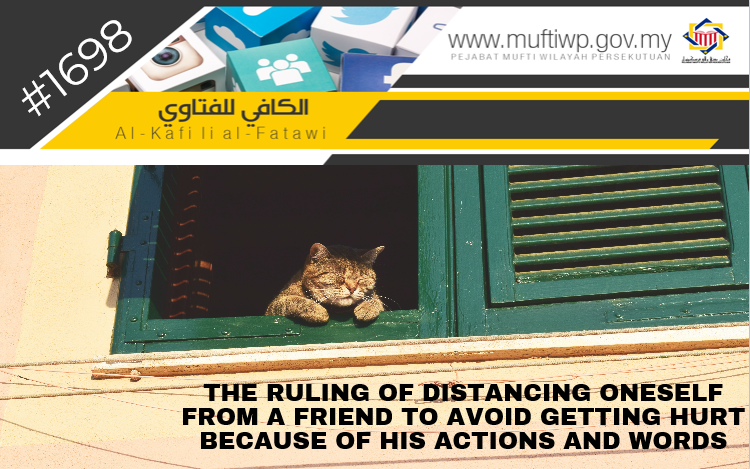
Question:
Assalamualaikum wrm.wbt.,
What is the ruling if we distance ourselves from a friend to avoid getting our feelings hurt because of his actions and words?
Answer:
Waalaikumussalam wrm. wbt.,
Alhamdulillah, praise and thanks to Allah for the countless blessings He has blessed us all with. Blessings and salutations to the Prophet Muhammad PBUH, his wives, his family, companions and all those that follow his teachings to the day of judgement.
In this issue we should realize that every Muslim should protect his tongue from hurting his other Muslim brothers. In a hadith narrated by Abdullah Ibn ‘Amru R.Anhuma, he said, the Prophet PBUH said:
الْمُسْلِمُ مَنْ سَلِمَ الْمُسْلِمُونَ مِنْ لِسَانِهِ وَيَدِهِ
“A Muslim is the one who avoids harming Muslims with his tongue or his hands.”
Sahih al-Bukhari (6484)
Imam Ibn Battal in his commentary on the above hadith stated:
والمراد بهذا الحديث الحض على ترك أذى المسلمين باللسان واليد والأذى كله
The above hadith states the commandment of avoiding any act that hurts or harms the Muslim ummah with his tongue, hands and everything that could hurt others.
Refer Syarah Sahih Al-Bukhari, Ibn Battal (1/62)
Coming back to the above question presented, the act of distancing oneself from someone who hurts us through his actions or words is encouraged in syarak. This is stated in a hadith narrated by Mu’adz bin Jabal RA, where he said, the Prophet PBUH said:
خَمْسٌ مَنْ فَعَلَ وَاحِدَةً مِنْهُنَّ كَانَ ضَامِنًا عَلَى اللهِ مَنْ عَادَ مَرِيضًا، أَوْ خَرَجَ مَعَ جَنَازَةٍ، أَوْ خَرَجَ غَازِيًا، أَوْ دَخَلَ عَلَى إِمَامِهِ يُرِيدُ تَعْزِيزهُ وَتَوْقِيرَهُ، أَوْ قَعَدَ فِي بَيْتِهِ فَسَلِمَ النَّاسُ مِنْهُ وَسَلِمَ مِنَ النَّاسِ
“Five matters where if a person does one of them, then he will be protected by Allah SWT are; a person who visits the sick, accompanying the deceased to the grave, battle in the war for the sake of Allah SWT (jihad), went to meet a leader to honour and respect him, or a person who stays at home so that people would be safe from him (his tongue and hands) and he is also safe (from the evils of tongue and hands) of people.”
Narrated by al-Thabrani in al-Mu’jam al-Kabir (55)
We could also see that it is stated in the above hadith where the Prophet PBUH said: “… or a person who stays at home so that people would be safe from him (his tongue and hands) and he is also safe (from the evils of tongue and hands) of people.”
Thus, it implies that the act of staying at home is a form of socially distancing oneself from the harm that could happen to us at the same time preventing us from harming or hurting others.
Likewise, it is stated in a hadith narrated by Abu Musa al-Asy’ari RA, wherehe said the Prophet PBUH said:
مَثَلُ الْجَلِيسِ الصَّالِحِ وَالْجَلِيسِ السَّوْءِ كَمَثَلِ صَاحِبِ الْمِسْكِ، وَكِيرِ الْحَدَّادِ، لاَ يَعْدَمُكَ مِنْ صَاحِبِ الْمِسْكِ إِمَّا تَشْتَرِيهِ، أَوْ تَجِدُ رِيحَهُ، وَكِيرُ الْحَدَّادِ يُحْرِقُ بَدَنَكَ أَوْ ثَوْبَكَ أَوْ تَجِدُ مِنْهُ رِيحًا خَبِيثَةً
"The example of a good companion (who sits with you) in comparison with a bad one, is like that of the musk seller and the blacksmith's bellows (or furnace); from the first you would either buy musk or enjoy its good smell while the bellows would either burn your clothes or your house, or you get a bad nasty smell thereof."
Sahih al-Bukhari (2101)
Imam Ibn Hajar al-Asqalani commented on the above hadith saying:
وَفِي الْحَدِيثِ النَّهْيُ عَنْ مُجَالَسَةِ مَنْ يُتَأَذَّى بِمُجَالَسَتِهِ فِي الدِّينِ وَالدُّنْيَا وَالتَّرْغِيبُ فِي مُجَالَسَةِ مِنْ يُنْتَفَعُ بِمُجَالَسَتِهِ فِيهِمَا
“In the hadith, there is a prohibition to socialize with those who disrupt (or hurt) others who are with them, regardless whether the harm is on religious or worldly matters. The same is stated (in the hadith), where it is encouraged for us to sit with those who would benefit us in our religious or worldly matters.”
Refer Fath al-Bari, Ibn Hajar (4/324)
Conclusion
To conclude, we would like to state that it is permissible to avoid individuals who would hurt us whether it is through their words or actions to prevent any harm from happening for both parties. Furthermore, distancing ourselves from socializing with others who would harm or hurt us whether it is in our worldly or religious matter is encouraged according to syarak.
However, we would like to also suggest while it is encouraged for us to distance ourselves, at the same time we should advise the person to stop hurting others through his words or actions. Moreover, we should always pray to Allah SWT to protect our friendships and bless us with good friends.
Lastly, we pray that Allah SWT would give us all the correct understanding in religion. Amin.

